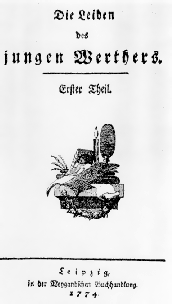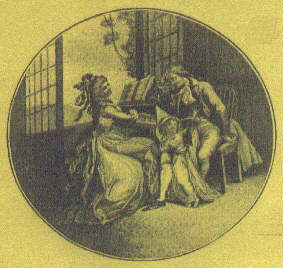This dispute becomes most evident at the topic of
suicide. Werther rejects all of
Albert's arguments and passionately defends the right to suicide, which he deems
to be an expansion of natural death. A human being whose "confines of
suffering" have been overstretched would perish of a "deadly disease"
which - having been caused by exterior influences - Werther believes to be
inevitable and without a cure. He
soon discovers symptoms of this disease within himself. In his letter of August 30th 1771,
his inner conflict between "pain and pleasure" becomes particularly
evident.
"... - When I have been with her for two or three
hours, entranced by her ways and the divine expressiveness of her words, and
my senses gradually become excited, my sight grows dim, I can hardly hear a
thing, I have difficulty breathing, as if a murderer had me by the throat, and then my heart
beats wildly, trying to relieve my tormented senses and only making their
confusion worse - Often, Wilhelm, I do not no if I exist at all! And if
melancholy is not allowed to prevail, and Lotte does not permit me the
miserable solace of weeping on her hand for relief, I have to leave, and go
out - and then I wander far and wide in the fields, and take pleasure in
climbing a precipitous mountain, and beating a path through thick forest, hurt
by the briers, torn by the thorns! Then I feel somewhat better! Somewhat! At
times I am so tired and thirsty that I lie out on the ground, late at night
with the full moon high above me, or I rest on a crooked tree trunk in the
remote depths of the forest, to ease my sore feet a little, and in my
exhaustion I slumber peacefully in the first light of day. Oh, Wilhelm! My
soul is so beset that I long for the pampered ease of a hermit's isolated
cell, for a hair-shirt and a barbed scourge.
Adieu! I see no end to my
misery but the grave."
It's in his unconditional love - he wants no woman
but her, sees her in all things and beings - that Werther's doom is founded. As
his unconditional love can not hope to find fulfillment in the moral and social
framework of the late 18th century and due to Lotte's refusal, the desire for
death constantly grows within Werther. Thus he writes on March 16:
"Ah, I have snatched up a knife a hundred
times, meaning to relieve my sorely beset heart. People tell of a noble breed
of horses that instinctively bite open a vein when they are exhausted and
feverish, in order to breathe more freely. I often feel the same, and am
tempted to open a vein and so find eternal freedom."
Besides suicide Werther sees only two more
solutions to his sheer unsolvable situation: For one, there'd be murdering Albert, as
in his thought on August 21: "What if Albert were to die?" ...then, we
might continue his reflection, he might hope that after this violent dissolution
of marriage's bonds, Lotte would be free for him. This road is symbolically
taken in the episode with the young servant who in his unfulfilled love for his
widowed mistress kills a contestant. Werther defends this crime because he is
able to empathize with the accused murderer. But he himself does not take that
road.
 As another alternative there remains insanity. This as
well is being depicted in the novel in a side plot. A former secretary with
Lotte's father had gone crazy over his hidden love for Lotte. Now he wanders in
wintertime lonely over meadows and looks
for flowers in the snow in order to pick them for his loved one and of course is
unable to find them.
As another alternative there remains insanity. This as
well is being depicted in the novel in a side plot. A former secretary with
Lotte's father had gone crazy over his hidden love for Lotte. Now he wanders in
wintertime lonely over meadows and looks
for flowers in the snow in order to pick them for his loved one and of course is
unable to find them.
Werther finally chooses suicide since he considers it to
be his own fault that his "heart
is dead." He attributes his pain to internal and stable
causes as psychologists would say. Thus being rooted in his personality, suicide
appears to be the sole means to ridding
himself of his sorrows.
The heart just mentioned takes a central role in
Goethe's novel, as it is the thread
that is woven into and connects all letters. As soon as the first letter, heart
is being talked about five times. It
is joyful, sad, suffering, feeling.
To the side of the heart steps the soul as its
companion, the soul as "the mirror of the infinite god". Now a
super-human power, God, is brought onto the stage. A god that
materializes in nature, the third central notion in the novel. Werther
does not confine himself to mere contemplation of nature and a description of
what he sees, but perceives his feelings to be reflected by nature.
Before Albert enters the scene, while Werther's sky of love is still unclouded,
his surroundings seem fresh, vitalizing, like springtime. Sunrises, walks in
green valleys, resting at creeks and fountains, life blossoms. But as
he becomes more conscious of the
hopelessness of his love for Lotte, nature seems to add to his desperation. Gloomy night strolls, where once there
every place seemed full of life and love, there now appears to be "nothing
but an ever devouring, ever chewing monster."
All these features harshly separate "The Sorrows of
Young Werther" from the pre-ceeding works of the literature of
Enlightenment. Reporting thus personally about a love that deeply violates the
stiff etiquette of a society dominated by nobility was unheard of. And even more
so when it ends by committing the sin of suicide. The central role that is
awarded to love and the entire palette of feelings in Goethe's novel did not
only hit his generation's zeitgeist. It also made a huge impression on
other young writers. A new generation had now found contents to revolt against
literary establishment.
Instead of pure reason, Enlightenment style, the
young authors aspired to draw a holistic, and more realistic image of human nature. The neglected world of emotion that
confronted the young generation in their own souls demanded its due place. The tempests of genius and emotion of the
Sturm&Drang era had drawn
near!
Although we might consider Goethe's old-fashioned
and sighing language at first glance as far away from ourselves as can be, we
notice at second thought that Goethe has created a timeless novel.
Its content - a deeply felt unfulfilled and thus
endlessly painful love that sends shivers down our spine, shakes our set of
emotions and leads our life to the rim of a frightening abyss - is an experience
that we ourselves can encounter as well nowadays as 230 years ago. And that's what Werther is written
for. Hence, once more Goethe at the
end:
''It must be bad, if not everybody was to
have a time in his life, when he felt as
though Werther had been written exclusively for
him."
All those whose thirst for
all things "Werther" has not yet been quenched may
find the following links I
assembled interessting... surf it up!
If you make use of any of the
material presented on this page or at this
site, please indicate your source
including the page's URL! And please
give me short notice that you could use
what I put toghether!
Should any questions have remained unanswered or if
you would like to
pour praise or critique on me, don't hesitate, sit down and
write an
Du bist Besucher
Nummer
 bei uns
! Schau Dich
doch noch weiter um, bei
bei uns
! Schau Dich
doch noch weiter um, bei
 Last revision :
03/10/2001
Last revision :
03/10/2001
© copyright
1996 - 2001 by Benedikt
Wahler 

 and her older fiancé Johann Christian Kestner. He
instantaneously falls in love with Charlotte and visits her often in the
following time.
and her older fiancé Johann Christian Kestner. He
instantaneously falls in love with Charlotte and visits her often in the
following time. As another alternative there remains insanity. This as
well is being depicted in the novel in a side plot. A former secretary with
Lotte's father had gone crazy over his hidden love for Lotte. Now he wanders in
wintertime lonely over meadows and looks
for flowers in the snow in order to pick them for his loved one and of course is
unable to find them.
As another alternative there remains insanity. This as
well is being depicted in the novel in a side plot. A former secretary with
Lotte's father had gone crazy over his hidden love for Lotte. Now he wanders in
wintertime lonely over meadows and looks
for flowers in the snow in order to pick them for his loved one and of course is
unable to find them.